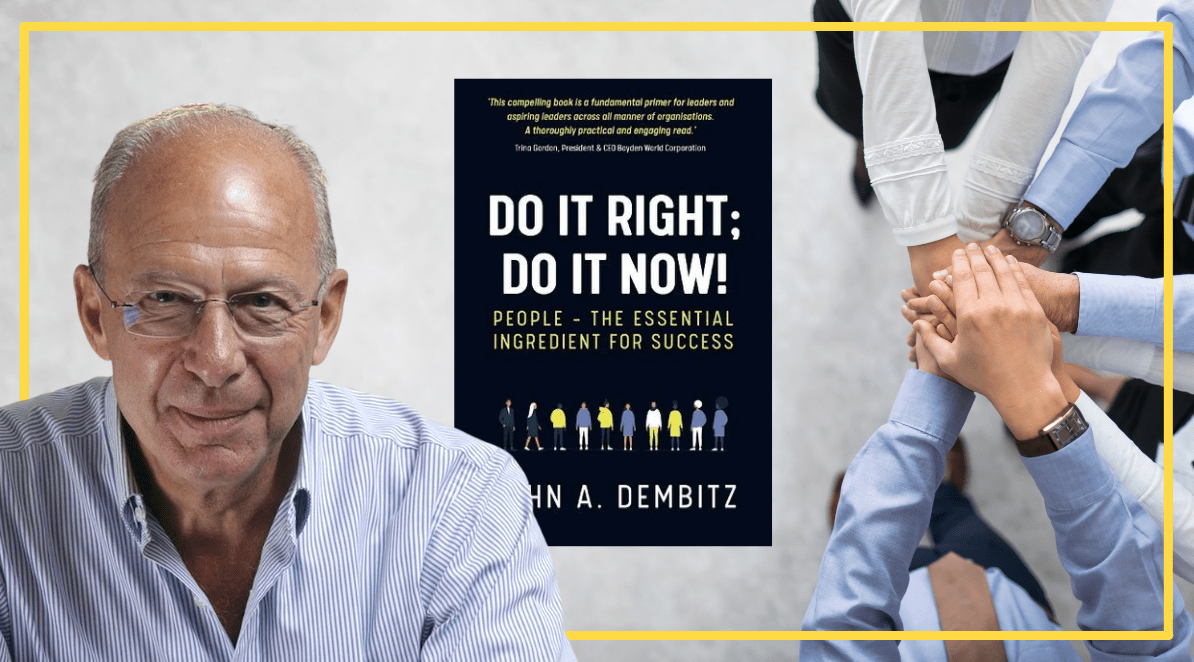Board members, directors, and leaders of large firms and corporations often forget that it’s ultimately their employees, the human capital, that makes their business successful. Treating employees right and making them feel valued is just as easy as abusing and exploiting them, but the benefits that motivated and committed employees can bring are invaluable.
“So why not treat employees right?” asks John A. Dembitz in his new book Do It Right; Do It Now! John has developed an unparalleled expertise in company management. After receiving an MBA from London Business School, he joined McKinsey & Co, served as CEO of corporate and financial communications consultancy Valin Pollen Ltd, and established with his brother, IDOM Consultancy. He has also holds and held many non-executive director and chairman positions, for instance at Titus International and the Pensions and Lifetime Saving Association. In his book, Do It Right; Do It Now! John shares the most important lesson he has learned: that people are the essential ingredient for success.
'Don't underestimate the power of asking why in the boardroom?'a NED delivers impact by challenging status quo – John Dembitz, #NED course
— IoD (@The_IoD) April 9, 2015
People, the AAA assets
The backbone of all successful firms, from SMEs to multinational corporations, is the people. So why are they too often not treated as such? This is a recurring theme of the book. In fact every chapter contains questions that press the reader to consider why the status quo remains as it is.
John argues that the main driver of human beings is passion. It is really easy to find passionate people in the early stages of a startup company or in a SME. These are the people who are in charge of their own businesses and destiny. But how do you maintain this passion when a business grows larger? Is retaining passion in large corporations even possible?
The answer, John says, is that it depends on leadership. Leaders have the ability to make their subordinates feel valued, create a cooperative and productive environment, and build a company that attracts talent easily.
Doing it right, from the first step
Making an employee feel valued starts way before the paperwork is singed and the new employee steps in the office on day one. The interview process, for instance, plays an important role in establishing how the aspiring employee perceives the company.
Indeed, John tells us a story about an experiment he conducted at the London Business School. He and his colleague assessed how various factors, such as the layout of furniture, the lighting of the room, and the attitude of the interviewers impacted a candidate’s performance. The results were tremendous: a more gentle atmosphere not only made the candidate perform better but also develop a more favorable opinion on the company.
One of the mistakes made by too many firms too often is the underutilisation of talent. Young graduates are full of passion and energy, but this energy often goes wasted when companies don’t harness the potential of their young employees. A similarly frustrating issue is external promotion. Internal candidates are often ignored when it comes to promotion, John says, which signals a total disregard of their efforts.
On the other end of the spectrum is what John calls “rant-abuse”, a phenomenon that has perhaps received more attention recently. Chasing graduates into physical and mental exhaustion and early burn out is not the best way to manage talent either, John says.
A group of first-year Goldman Sachs investment banking analysts presented management with a slide deck describing arduous working conditions, including an average work week of 95 hours, with five hours of sleep a night starting at 3am https://t.co/ioynkCGEb3
— Financial Times (@FinancialTimes) March 19, 2021
Long-lasting relationships
What companies should also remember is that a former employee can impact the business in countless ways, some less obvious than others. They might become a clients themselves or consumers in other ways. On the other hand, bad memories are hard to forget and may impact on a company’s reputation long after the employee has left. But making an employee feel valued can bring about invaluable benefits long after they have left.
John uses McKinsey’s alumni network as an example of this. This is something McKinsey invests in and it is part of McKinsey’s strategy to have a well-resourced and connected alumni network. Many years after John left, McKinsey’s office in Moscow was amazingly helpful in securing tickets for Tchaikovsky’s Nutcracker, in St Petersburg that was impossible to secure elsewhere!
Very impressive to see companies that invest heavily in their alumni networks –
— Nikhil Krishnan (@nikillinit) May 21, 2019
McKinsey does this very well for example (and makes financial sense, with many McKinsey alumni eventually hiring the firm to do more work in the future)
The surprising fact about the book is that it doesn’t share with you magical or supernatural secrets to quality company management. As John notes himself, it’s not rocket science. It simply reiterates the small things that should be obvious to all of us, but which we often forget about as we get too caught up completing our daily tasks.
Reading the book, however, you might find surprising resemblances between John’s stories and your own experiences. This is what makes the book a fascinating and eye-opening read, and a valuable contribution to an important topic.
Author: Benjamin Jenei
#Consultancy #CompanyManagement #CorporateLeaders #Entrepreneurship #StartUps #SMEs #B2C #B2B #Leadership #McKinsey















